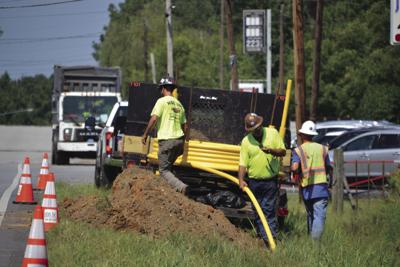Replacing outdated cast iron gas lines has been a top priority for city officials, and the recent gas leak scare at Tallassee High School during the Senior Awards Night added emphasis to the ongoing infrastructure project.
According to Mayor John Hammock, the city recently came very close to a catastrophe that could have taken hundreds of lives. An estimated 300 people, many of whom were students, parents, teachers, and staff, had to be evacuated to the First United Methodist Church across the street from the school due to a break in a gas line.
"I was worried that wasn't far enough because it was such a large gas leak," Hammock said.
Hammock, who is also the superintendent of utilities, said the gas leak cost the city $70,000 in wasted natural gas, and that estimate does not include the cost for overtime pay for employees in the utility department who had to work late into the evening to stop the leak.
"That's what we lost in just BTUs, and we're losing that constantly all over the city," Hammock said.
To avoid a potential future tragedy, members of the city council voted in favor of looking at a $5 million bond that will replace 18-22 miles of the outdated cast-iron gas pipeline in the city.
"These pipes were put in in the 40s," Hammock said. "These things are 80-years-old."
In addition to replacing cast iron gas pipelines, Hammock also aims to replace the old cast iron gas mains that are limited in the amount of pressure they can withstand.
"You cannot put much pressure on these lines," Hammock said. "If someone comes in and says they need an eight-inch line with 60psi, we'll put so much pressure on the line that we'll have even more leaks. For us to grow, this is going to be a problem for economic development."
Replacing these outdated pipes has been an ongoing process. However, with 35-miles of cast iron gas pipelines below the city's terrain, there is still much work to be done.
"We have replaced a few miles (of cast iron gas lines) since 2016," Hammock said.
In east Tallassee, there are 12.9 miles of cast iron gas lines still in place, and 22.2 miles in West Tallassee.
Between 2018 and 2020 the city has invested $530,000 in cast iron gas line replacement, most of that on the east side of the city. At that rate, it would take 15-years to replace all of the existing cast iron gas pipelines, according to Hammock.
"That's a conservative number. It would probably take 20-25 (years)," he said.
Not only does the city have to replace the old cast iron pipelines, but the vacant lines that run from the main to homes that no longer use gas will soon have to be removed under federal guidelines.
Only 2 percent of gas lines in the state are cast iron pipes. The Alabama Public Service Commission, which aims to provide consumers with safe, adequate, and reliable services, has put pressure on city officials in the past to replace the cast iron pipeline.
Hammock approached the council about replacing most of the outdated gas lines in one large project and going to the bond market to fund the project.
"Right now, rates are still at a historical low," he said. "Rates are going to start going up. It's inevitable."
A $5 million bond would cover the cost of replacing 18-22 miles of cast iron gas pipelines.
According to Hammock, a $5 million bond would equate to payments of about $50,000 a year for 30 years/ per million.
"We're looking at debt service of $250,000 a year for 30 years," he said. "We'd have three-quarters of all of our gas lines replaced in one job."
Replacing the majority of the city's cast iron gas pipelines in one project will also bring the overall cost of the project.
"It typically yields a lower cost on liner footage. Where we've been paying 45 (per linear foot). If we do it in a big project like this, we can probably get it at the prices of $30-32 a linear foot," he said.
Hammock stressed safety when replacing the outdated gas lines. He pointed out three past natural gas explosions in the state, one as close as Auburn in the late 70s.
"From a safety standpoint, this is critical," Hammock said. "From a financial standpoint, this is fiscally responsible."
Councilmember Jeremy Taunton asked about replacing the entirety of the city's outdated gas pipelines in one project, but that would take more than a $5 million bond, and repayments would exceed $250,000 annually. The city already has $300,000 earmarked for annual cast iron gas line placement.


